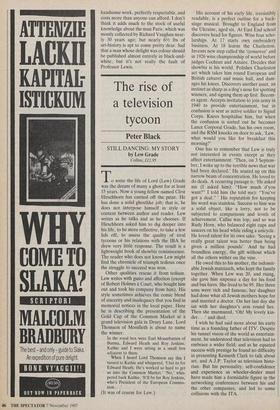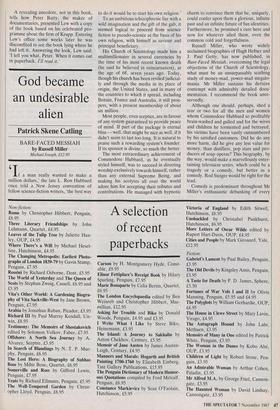The rise of a television tycoon
Peter Black
STILL DANCING: MY STORY by Lew Grade
Collins, f12.95
To write the life of Lord (Lew) Grade was the dream of many a ghost for at least 15 years. Now a young fellow named Clive Hirschhorn has carried off the prize. He has done a solid ghostlike job; that is, he does not interpose himself in style or content between author and reader. Lew writes as he talks and as he chooses. If Hirschhorn asked him to dig deeper into his life, to be more reflective, to take a few lids off, to assess the quality of rival tycoons or his relations with the IBA he drew very little response. The result is a lightweight book of showbiz reminiscence. The reader who does not know Lew might find the chronicle of triumph tedious once the struggle to succeed was won.
Other qualities rescue it from tedium. Lew writes with gusto and affection (except of Robert Holmes a Court, who bought him out and took his company from him). His style sometimes achieves the comic blend of sincerity and inadequacy that you find in memorial notices in the local paper. Here he is describing the presentation of the Gold Cup of the Common Market at a grand television gala in Drury Lane. Lord Thomson of Monifieth is about to name the winner.
In the royal box were Earl Mountbatten of Burma, Edward Heath and Roy Jenkins. Kathie and I were sitting in a small box adjacent to them.
When I heard Lord Thomson say this I turned to Kathie and whispered, 'I bet its for Edward Heath. He's worked so hard to get us into the Common Market.' No,' whis- pered back Kathie, 'It'll be for Roy Jenkins, who's President of the European Commis- sion...'.
(It was of course for Lew.) His account of his early life, irresistibly readable, is a perfect outline for a back- stage musical. Brought to England from the Ukraine, aged six. At East End school discovers head for figures. Wins four scho- larships. At 17 starts own embroidery business. At 18 learns the Charleston.
Invents new step called the 'crossover' and in 1926 wins championship of world before judges Cochran and Astaire. Decides that showbiz is his world. Polishes Charleston act which takes him round European and British cabaret and music hall, and dam- ages his knees. Discovers another asset, an instinct as sharp as a dog's nose for spotting winners, and signing them up first. Becom- es agent. Accepts invitation to join army in 1940 to provide entertainment, but in confusion is sent as active soldier to Signal Corps. Knees hospitalise him, but when the confusion is sorted out he becomes Lance Corporal Grade, has his own room, and the RSM knocks on door to ask, 'Lew, what would you like for breakfast this morning?'
One has to remember that Lew is truly not interested in events except as they affect entertainment. 'Then, on 3 Septem- ber, I woke up to the terrible news that war had been declared.' He soared up on this narrow beam of concentration. He loved to do deals. A recurring passage is: 'He asked me (I asked him): "How much d'you want?" I told him (he told me): "You've got a deal." ' His reputation for keeping his word was stainless. Success to him was a solid object, like a lorry, not to be subjected to comparisons and levels of achievement. Callas was top, and so was Rudy Horn, who balanced eight cups and saucers on his head while riding a unicycle. He loved talent for its own sake. 'Seeing a really great talent was better than being given a million pounds'. And he had boundless energy, the gift without which all the others wither on the vine.
He owed this to his mother, the indomit- able Jewish matriarch, who kept the family together. When Lew was 20, and rising, she gave him sixpence a day for his food and bus fares. She lived to be 95. Her three sons were rich and famous, her daughter had done what all Jewish mothers hope for and married a doctor. On her last day she sat with her daughter's arm round her. Then she murmured, 'Oh! My lovely kin- der. . .' and died.
I wish he had said more about his early time as a founding father of ITV. Despite his tunnel vision of the world as entertain- ment, he understood that television had to embrace a wider field; and as he equated success with prestige he found no difficulty in presenting Kenneth Clark to talk about art, and A.J.P. Taylor as television histo- rian. But his personality, self-confidence and experience as wheeler-dealer must have made him a formidable figure in the networking conferences between his and the other companies, and led to some collisions with the ITA. A revealing anecdote, not in this book, tells how Peter Batty, the maker of documentaries, presented Lew with a copy of the book based on his celebrated pro- gramme about the firm of Krupp. Entering Lew's office some weeks later he was discomfited to see the book lying where he had left it. Answering the look, Lew said: `I tell you what, Peter. When it comes out in paperback, I'll read it.'



































































 Previous page
Previous page